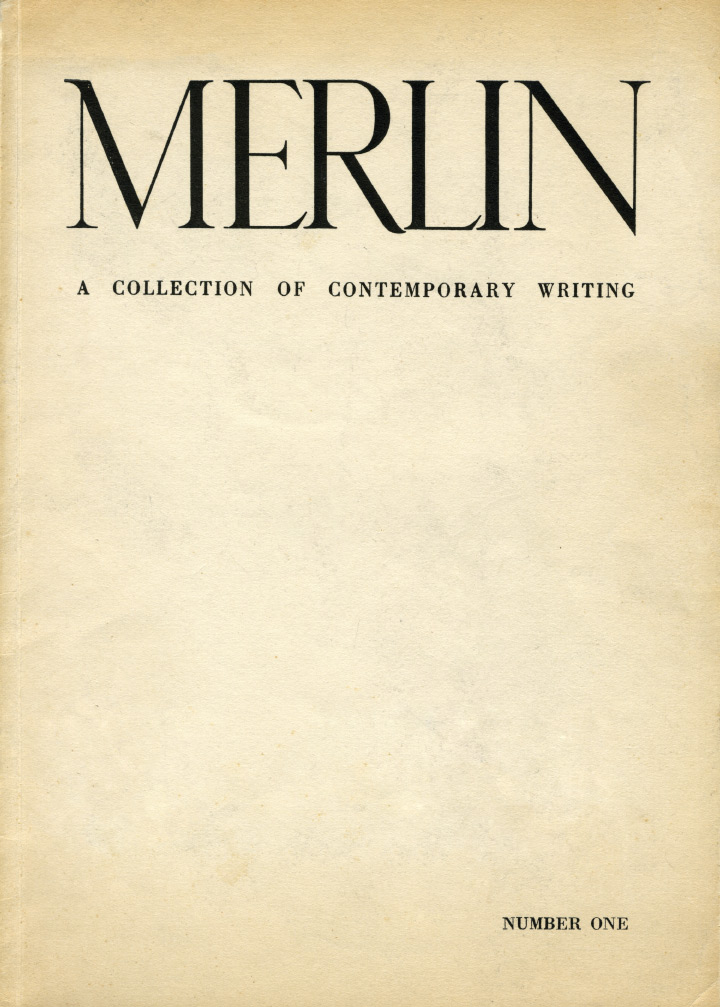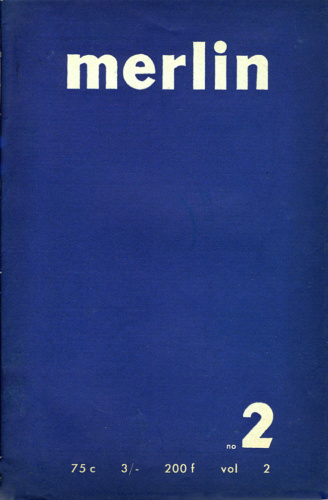Merlin: A Collection of Contemporary Writing
Alexander Trocchi
Paris
Merlin vol. 1, no. 1–vol. 3, no. 1 (Spring 1952–Spring/Summer 1955).
Merlin 1 (Spring 1952).

Alexander Trocchi was born in Glasgow, Scotland, in 1925. He studied literature with Edwin Morgan at Glasgow University and was greatly influenced by French existentialism, in particular Sartre’s concept of littérature engagée; to some extent, he invented himself as an engaged outsider. Trocchi moved to Paris in 1952 with his wife and children but left them there. He soon met and fell in love with a nineteen-year-old American, Alice Jane Lougee. Alice Jane was in discussion with Australian poet Alan Riddell about starting a magazine to be called Lines. After she met Trocchi, he was quickly brought in to be coeditor of Lines with Lougee as publisher (she regularly received a small sum of money from her father, a banker in Limerick, Maine). Trocchi soon split with Riddell—who went on to found the very successful Lines, which became Lines Review, in Edinburgh—and together with Lougee, founded Merlin: A Collection of Contemporary Writing. The first of seven issues came out on May 15, 1952. The name of the magazine was suggested by Christopher Logue, with reference to the falcon rather than the wizard. Merlin’s mission statement was articulated in a lengthy essay by Trocchi in no. 2, “MERLIN will hit at all clots of rigid categories in criticism and life, and all that is unintelligently partisan.”
Contributors to nos. 1–2 include: William Burford, Trocchi, Christopher Logue, Patrick Brangwyn, Alfred Chester, H. Charles Hatcher, James Fidler, Patrick Bowles, Richard Seaver, and A. J. Ayer (an essay on existentialism). Richard Seaver was on a fellowship in Paris, where he discovered the work of Samuel Beckett.
Seaver published an essay on Beckett in no. 2 and eventually brought Trocchi and Samuel Beckett together; Patrick Bowles would later, in collaboration with Beckett, translate Molloy. Beckett published a section of Watt (which was written in English) in no. 3. Trocchi, Seaver, Lougee, and others in the Merlin group were so taken with Beckett’s work they began the imprint “Collection Merlin” to publish Watt; they later published the first English-language edition of Molloy. Maurice Girodias took an interest in the publishing venture, as a result of which, “Collection Merlin” became an imprint of Olympia Press.
By vol. 2, no. 1, with Seaver as advisory editor and director, Merlin had contributions from Jean-Paul Sartre, Jean Genet, Henry Miller, Eugene Ionesco, Ernst Fuchs, William Sansom, Alan Riddell, and Paul Éluard, among many others. Merlin published eight issues and ended in 1955.
Collection Merlin books include
Beckett, Samuel. Malloy: A Novel. 1955. Translated by Patrick Bowles.
Beckett, Samuel. Watt. 1953. 1,100 numbered copies were issued.
Broughton, James. An Almanac for Amorists. 1955. Designed and illustrated by Kermit Sheets in an edition of 676 copies of which 26 are lettered and 150 numbered and signed by the author.
Genet, Jean. The Thief’s Journal. 1954. Translated by Bernard Frechtman, foreword by Jean-Paul Sartre.
Logue, Christopher. Wand and Quadrant. 1953. Published in an edition of 600 copies of which 300 are numbered.
de Musset, Alfred. Passion’s Evil. 1953.
Wainhouse, Austryn. Hedyphagetica…. 1954.

Merlin, vol. 2, no. 2 (1953).
